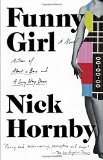Summary | Excerpt | Reading Guide | Reviews | Beyond the Book | Read-Alikes | Genres & Themes | Author Bio

This article relates to Funny Girl
Funny Girl is set in the Swinging Sixties in Britain in the world of television shows and their production.
 The British Broadcasting Corporation, or BBC, got its start in 1922 with professional radio shows. Regular television service began in 1936 and has continued ever since. The 1940s saw the first instance of live television, a boon during war reporting. One of the most important events of the 1950s in Britain was Queen Elizabeth II's coronation, and many people bought televisions specifically so they could watch coverage of it.
The British Broadcasting Corporation, or BBC, got its start in 1922 with professional radio shows. Regular television service began in 1936 and has continued ever since. The 1940s saw the first instance of live television, a boon during war reporting. One of the most important events of the 1950s in Britain was Queen Elizabeth II's coronation, and many people bought televisions specifically so they could watch coverage of it.
With the 1960s and 1970s came color television and some of the most enduringly popular British comedies, including some that made it across the pond to America:
Some titles that were very popular in the UK but may not be as familiar to American viewers are Steptoe and Son (1962) [the basis for the American show Sanford and Son], The Likely Lads (1964), The Morecambe and Wise Show (1967), The Liver Birds (1969), and The Two Ronnies (1971).
Meanwhile, I Love Lucy was a huge US to UK crossover hit, as evidenced in Nick Hornby's Funny Girl. Lucille Ball even filmed a TV special called Lucy in London in 1966. Hornby uses some documentary black-and-white photographs as illustrations in the text, including a still from the filming, and he also has his main character, Sophie Straw, meet Lucy on the set.
One of the above sitcoms, Till Death Us Do Part, plays a major role in Funny Girl. In the novel, it starts airing one year after Barbara (and Jim) and appears to be a key rival, "so far ahead of the field when it comes to daring, rawness, and confrontation" that it "has made all its competitors seem a little staid," Hornby writes in a fictional Times review.
Hornby has disclosed that the inspiration for his central writing duo, Bill and Tony, came from a famous scriptwriting pair, Ray Galton and Alan Simpson. Although they did not meet in quite the same way that Bill and Tony did in the novel, it was still an unusual story: they were patients at the same sanatorium, recovering from tuberculosis in 1948. They went on to win acclaim for a number of comedies such as Steptoe and Son, but one of their first successes was the Comedy Playhouse series of short plays for the BBC – and it is in one of these that the fictional Sophie gets her start.
Picture of Monty Python cast from BBC
Filed under Cultural Curiosities
![]() This "beyond the book article" relates to Funny Girl. It originally ran in March 2015 and has been updated for the
February 2016 paperback edition.
Go to magazine.
This "beyond the book article" relates to Funny Girl. It originally ran in March 2015 and has been updated for the
February 2016 paperback edition.
Go to magazine.
Show me the books he loves and I shall know the man...
Click Here to find out who said this, as well as discovering other famous literary quotes!
Your guide toexceptional books
BookBrowse seeks out and recommends the best in contemporary fiction and nonfiction—books that not only engage and entertain but also deepen our understanding of ourselves and the world around us.